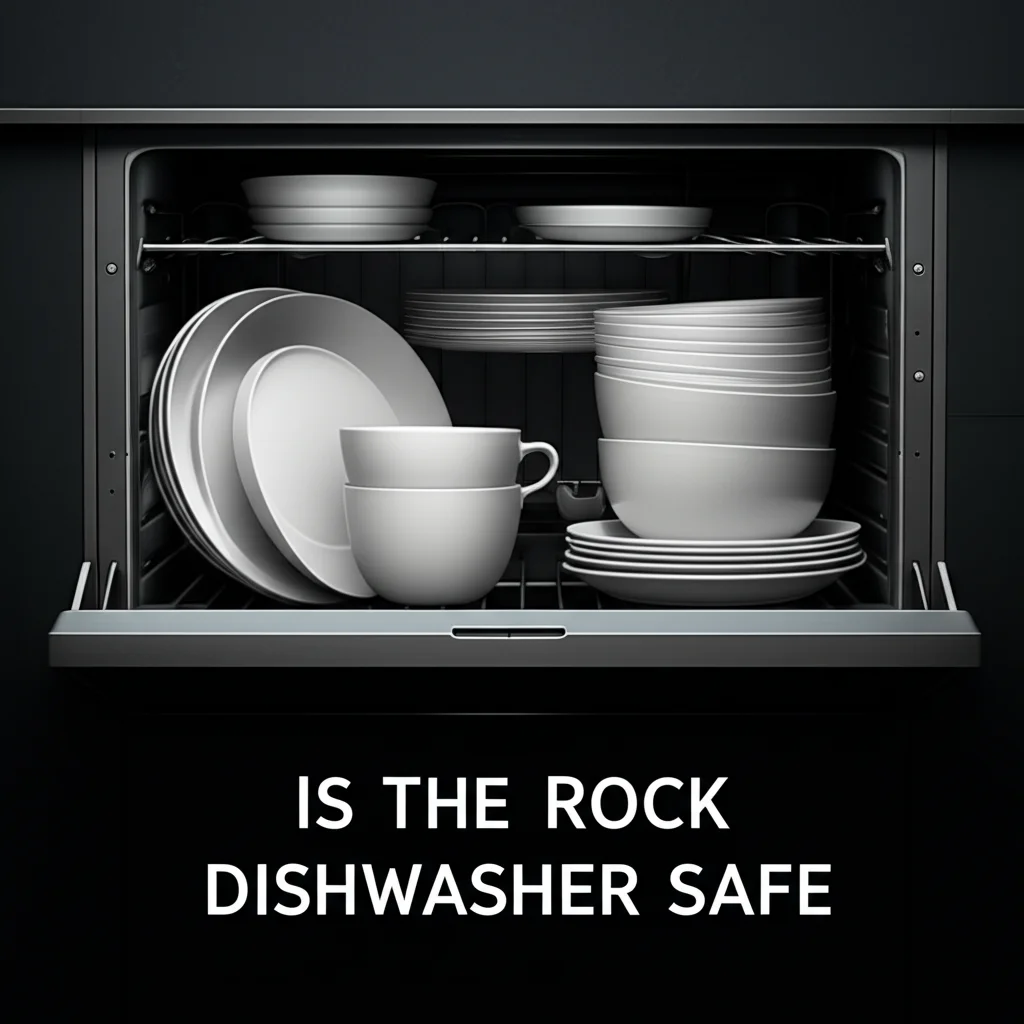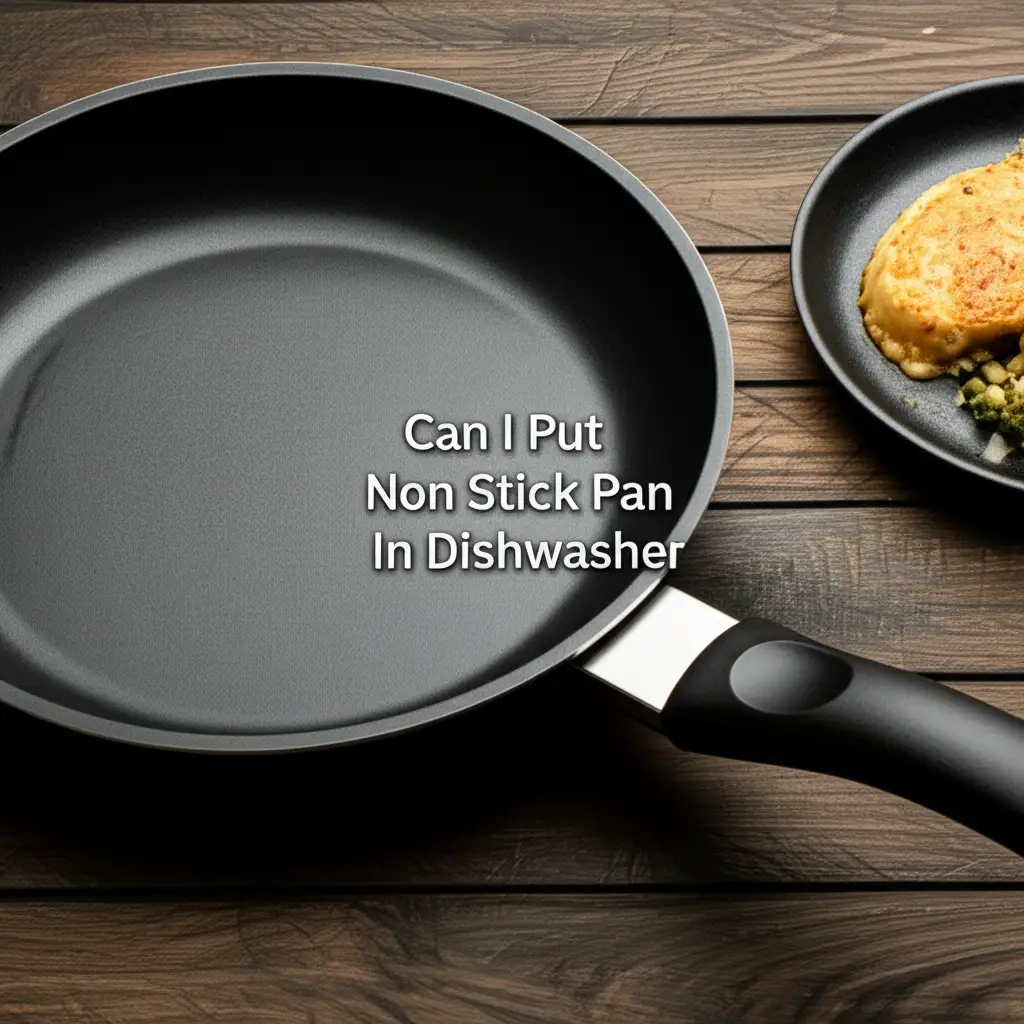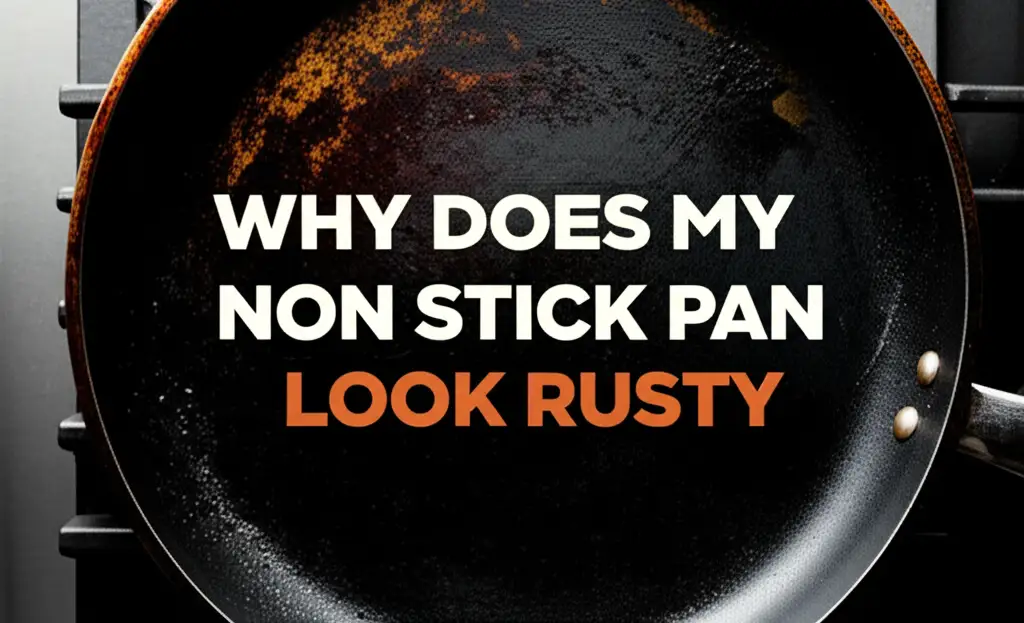· Katria Melrose · Kitchen Cookware Care · 19 min read
Is The Rock Dishwasher Safe

Is The Rock Cookware Dishwasher Safe? The Definitive Guide
We all seek quick cleaning solutions in our busy lives. For cookware, this often means asking if it can go into the dishwasher. You own “The Rock” cookware, known for its unique nonstick surface, and naturally wonder about its care. Can you simply toss your favorite pan into the machine, or does it require a more gentle approach?
This article explores the ideal cleaning methods for “The Rock” cookware. We will look at why hand washing offers benefits for your pans. We also cover what happens if you choose to use a dishwasher. My goal is to help you keep your “The Rock” pieces performing at their best for many years. We discuss proper care and maintenance tips.
Takeaway
- Hand washing is the best method for “The Rock” cookware: This preserves the nonstick coating and extends product life.
- Dishwasher use can damage coating: High heat, harsh detergents, and agitation wear down the “Rock.Tec” surface.
- Check manufacturer guidelines: Always refer to specific instructions from Starfrit for your model.
- Preventative measures help: Cook on lower heat and avoid metal utensils.
- Proper storage is key: Protect the nonstick surface from scratches during storage.
The Clear Answer: “The Rock” cookware is generally not recommended for dishwasher cleaning by the manufacturer, Starfrit. While some models may state “dishwasher safe” on the packaging, hand washing is the preferred method to protect the nonstick “Rock.Tec” surface and ensure the longevity and performance of your pans.
Understanding “The Rock” Cookware’s Unique Surface
“The Rock” cookware stands out in kitchens because of its special surface. This surface is called “Rock.Tec.” It offers impressive nonstick properties. This technology makes the pan’s surface harder and more durable.
The manufacturing process involves tiny hard particles. These particles create a textured, rock-like surface. This texture helps food release easily. It also makes the pan resistant to scratches. People choose “The Rock” because it offers both convenience and durability. This special surface is key to the pan’s performance.
Traditional nonstick coatings can wear down quickly. They often lose their effectiveness over time. “The Rock” aims to solve this common problem. Its unique surface intends to last longer. It resists common wear and tear better than many standard nonstick pans. This improved durability is a major selling point.
Despite its toughness, this specialized surface still needs care. It is not indestructible. High heat and abrasive cleaning can compromise its integrity. Understanding how this surface works helps us clean it properly. We can then ensure its nonstick qualities remain. Proper care maintains the pan’s ability to cook food evenly.
The “Rock.Tec” treatment creates a microscopic texture. This texture reduces the contact area between food and the pan. This means food sticks less. It makes cooking and cleanup easier. This innovative design makes “The Rock” a popular choice. Its performance relies on this unique surface.
Why Hand Washing Protects Your “The Rock” Cookware
Hand washing remains the best way to clean “The Rock” cookware. This method offers gentle care. It protects the unique “Rock.Tec” nonstick coating. Dishwashers can be too harsh for these specialized surfaces.
First, consider the water temperature in a dishwasher. Dishwashers use very hot water. This high heat can weaken nonstick coatings over time. Repeated exposure to extreme temperatures can cause the material to break down. The pan’s nonstick ability might decrease. The surface could become dull.
Next, think about dishwasher detergents. These detergents contain strong chemicals. They often have abrasive agents. These agents can strip away the nonstick layer. They scrub the surface with high pressure water. This harsh cleaning action can scratch or erode the coating. Over time, your pan will lose its nonstick properties.
Dishwashers also involve jostling and banging. Items move around inside the machine during cycles. This movement can cause your “The Rock” pans to hit other dishes. Such impacts can chip or scratch the nonstick surface. Even small scratches compromise the pan’s effectiveness. They can also expose the base metal underneath.
I always hand wash my “The Rock” pans. I use warm, soapy water and a soft sponge. This gentle approach cleans effectively without causing damage. It helps the nonstick surface last much longer. This ensures my pans continue to perform like new.
For other kitchen items, hand washing can also be a better choice. For example, some people wonder, are stainless steel mixing bowls dishwasher safe? While many stainless steel items are fine in a dishwasher, delicate pieces might still benefit from hand washing to preserve their finish. Taking this small extra step protects your investment.
The Risks of Dishwashing “The Rock” Pans
Putting “The Rock” pans in the dishwasher carries several risks. These risks affect the pan’s performance and lifespan. Understanding these potential issues helps you make an informed decision. I want my cookware to last, so I pay attention to these details.
One major risk is damage to the nonstick coating. Dishwashers use high-pressure water jets. These powerful jets can be too aggressive for the delicate “Rock.Tec” surface. Over time, the coating can degrade. It might start to peel or flake. This ruins the nonstick property of the pan.
Another concern is the harshness of dishwasher detergents. These detergents contain strong chemicals. They are designed to cut through tough grease and baked-on food. While effective, these chemicals are abrasive. They can wear down the nonstick layer. This accelerated wear means your pan will not perform well for long.
The high heat inside a dishwasher is also a problem. Extreme temperatures can cause thermal shock. This shock can warp the pan’s base. A warped pan does not sit flat on the stovetop. This leads to uneven heating. Your food will cook poorly.
Dishwashers can also cause discoloration. The exterior of your “The Rock” pan might fade. The handles could become brittle or discolored. This affects the pan’s appearance. It can also compromise the handle’s grip or durability.
Considering a similar nonstick brand, is Gotham Steel dishwasher safe? Manufacturers of most nonstick cookware often advise against frequent dishwashing for similar reasons. These warnings exist to help you protect your purchase. It is wise to heed them.
Some people also wonder about other kitchen items. For example, can my air fryer go in the dishwasher? The answer often depends on the specific parts and materials. Just like with “The Rock,” delicate parts or specialized coatings usually require hand washing. I learned this the hard way with some of my own kitchen gadgets.
In short, while convenient, the dishwasher is a hostile environment for “The Rock” cookware. The risks of damage outweigh the time saved.
Proper Hand Washing Steps for “The Rock” Cookware
Hand washing “The Rock” cookware is simple. It ensures your pans stay in top condition. This method extends the life of the nonstick surface. Follow these steps for the best results.
First, let the pan cool down completely after use. Never put a hot pan under cold water. This can cause thermal shock. Thermal shock can warp the pan. It can also damage the nonstick coating. Patience here protects your investment.
Next, gather your cleaning supplies. You need warm water, a mild dish soap, and a soft sponge or cloth. Avoid abrasive scrubbers. Steel wool pads or harsh brushes will scratch the nonstick surface. Even a green scouring pad can cause microscopic damage over time.
Now, begin washing the pan. Add a small amount of dish soap to the warm water. Use the soft sponge to gently wipe down the entire surface. Pay attention to any food residue. The nonstick coating usually makes cleanup very easy. Most food slides right off.
For stubborn, stuck-on food, do not scrape. Instead, fill the pan with warm, soapy water. Let it soak for 15-20 minutes. This softens the food particles. After soaking, the food should wipe away easily. I find this trick works every time.
Finally, rinse the pan thoroughly with clean water. Make sure to remove all soap residue. Then, dry the pan completely with a soft towel. Leaving water spots can lead to mineral buildup. This can affect the pan’s appearance. Proper drying also prevents rust on exposed metal parts.
These simple steps protect your “The Rock” cookware. They keep the nonstick surface performing well. This gentle care ensures you enjoy cooking with your pans for many years. It is a small effort for a big reward.
Extending the Lifespan of “The Rock” Cookware
Extending the lifespan of your “The Rock” cookware goes beyond just cleaning. Proper use and storage play a huge role. I want my kitchen tools to last, so I follow these guidelines.
1. Use Appropriate Utensils: Always use non-metal utensils when cooking. Silicone, wood, or nylon tools are best. Metal spatulas or spoons can scratch the “Rock.Tec” surface. Even small scratches compromise the nonstick properties. Once scratched, the pan’s performance decreases.
2. Control Cooking Temperatures: “The Rock” cookware performs well at medium to medium-low heat. High heat can damage the nonstick coating over time. It can also warp the pan. The manufacturer recommends not using very high temperatures. This preserves the pan’s integrity. It also prevents food from sticking due to overheating.
3. Avoid Cooking Sprays: Aerosol cooking sprays can leave a sticky residue. This residue builds up over time. It is very hard to remove. This sticky layer can make your pan appear to lose its nonstick properties. Instead, use a small amount of butter or oil directly.
4. Proper Storage Techniques: Protect your pans during storage. Do not stack them directly on top of each other. This can scratch the nonstick surface. Use pan protectors, paper towels, or soft cloths between stacked pans. Hanging pans is also an excellent option. This ensures the cooking surface remains untouched.
5. Avoid Extreme Temperature Changes: As mentioned earlier, let your pan cool completely before washing. Sudden temperature changes can warp the pan. This stress also degrades the nonstick coating. Consistency in temperature handling prevents long-term damage.
By following these practices, you can significantly extend the life of your “The Rock” cookware. It means you get to enjoy its nonstick benefits for many meals. These steps ensure your pans remain a valuable asset in your kitchen for a long time.
When “Dishwasher Safe” Might Still Mean “Hand Wash Recommended”
The term “dishwasher safe” often creates confusion. For many products, it means the item will likely survive a dishwasher cycle. However, it does not always mean the item will thrive or maintain its original quality. This distinction is crucial for cookware like “The Rock.”
Manufacturers label items “dishwasher safe” if they pass specific tests. These tests confirm the item will not break or melt. They also ensure it will not release harmful chemicals. But these tests do not always account for long-term wear. They do not guarantee the item will look or perform perfectly after many cycles.
For nonstick cookware, “dishwasher safe” often means the coating will not immediately peel. It does not mean the coating will retain its optimal nonstick properties forever. Dishwashers use high heat and strong detergents. These elements are inherently harsh. They cause gradual erosion of delicate surfaces.
Think about other kitchen items. Can you put Dutch ovens in the dishwasher? While some enameled cast iron Dutch ovens are technically dishwasher safe, most owners hand wash them. This protects the enamel finish and prevents dulling. The same logic applies to “The Rock” pans.
I have seen many “dishwasher safe” items degrade over time. Their colors fade. Their surfaces become rough. Their functionality decreases. This is especially true for items with specialized coatings. The convenience of machine washing comes at a cost.
So, when you see “dishwasher safe” on “The Rock” cookware, interpret it with caution. It is a baseline for survival. It is not a guarantee of sustained performance. For maximum longevity and performance, hand washing remains the superior choice. I always advise my friends to err on the side of caution with their favorite kitchen tools.
Comparing “The Rock” to Other Cookware Types in the Dishwasher
Different types of cookware react differently to dishwashers. Understanding these differences helps us appreciate why “The Rock” benefits from hand washing. Each material has its own vulnerabilities.
Stainless steel cookware is often very durable in a dishwasher. It resists corrosion and warping. However, harsh detergents can sometimes leave water spots or a hazy film. Still, stainless steel handles machine washing better than many other materials. You can usually put stainless steel items in without much worry.
Cast iron is rarely dishwasher safe. The harsh detergents strip away its seasoning. Seasoning is a protective, nonstick layer of polymerized oil. Dishwashing makes cast iron rust. It then requires re-seasoning before next use. This is a lot of extra work.
Ceramic cookware varies. Some ceramic nonstick pans can handle light dishwasher use. Others are very fragile. The coatings can chip or scratch easily. Always check the manufacturer’s specific instructions. When in doubt, hand wash.
Anodized aluminum, common in many quality pots and pans, can also suffer. Dishwashers might discolor it. The dark, protective layer can fade or become splotchy. This affects the look of the pan. It also removes some of its protective qualities.
“The Rock” cookware, with its “Rock.Tec” nonstick surface, falls into a category requiring more care. It is similar to other nonstick brands, such as those where you might ask, can Calphalon knives go in the dishwasher? While some knives are “dishwasher safe,” professional chefs and keen cooks often hand wash their good knives to preserve sharpness and handle integrity.
The “Rock.Tec” coating is an engineered surface. It needs gentle cleaning to stay effective. It is tougher than basic Teflon, but it is not immune to the rigors of a dishwasher. For this reason, I always prioritize hand washing for “The Rock” pans. This ensures the unique surface remains intact and fully functional for cooking.
Addressing Common Cleaning Mistakes with Nonstick Pans
Many common cleaning mistakes can shorten the life of nonstick pans, including “The Rock.” Avoiding these errors helps maintain your cookware’s performance. I want to share what I’ve learned.
First, using abrasive cleaning tools is a major mistake. Steel wool, metal scrubbers, or even highly abrasive sponges can scratch the nonstick surface. Even tiny scratches compromise the coating. Food then starts to stick in those areas. Always use soft cloths or sponges.
Second, using harsh detergents is detrimental. Some dish soaps are too strong for nonstick surfaces. They can strip away the nonstick layer over time. Always opt for mild dish soap. This gentle approach cleans effectively without causing damage.
Third, not cooling the pan before washing is a common error. Washing a hot pan with cold water causes thermal shock. This can warp the pan’s base. A warped pan does not sit flat on the stove. This leads to uneven cooking. Always allow your pan to cool to room temperature before cleaning.
Fourth, using very high heat during cooking impacts cleanup. Overheating causes food to bond more aggressively to the surface. While “The Rock” is resilient, extreme temperatures can still make cleanup harder. It also stresses the coating. Cook on medium or low heat for best results and easier cleaning.
Fifth, stacking pans without protection is a mistake. When you stack pans directly, the bottom of one pan can scratch the cooking surface of the pan below it. This damages the nonstick coating. Use pan protectors or soft towels between stacked pans.
These common mistakes apply to many kitchen items. For example, can stove burners go in dishwasher? While some might be dishwasher safe, others can be damaged by harsh detergents or high heat, leading to discoloration or reduced effectiveness. It is always best to check manufacturer recommendations or err on the side of caution with delicate parts.
By avoiding these cleaning pitfalls, you can ensure your “The Rock” cookware remains highly functional. Proper care extends its nonstick life. This means less effort in the kitchen for you.
Maintaining Your Dishwasher for Cookware Safety
While hand washing is best for “The Rock” cookware, understanding dishwasher maintenance is still useful. A well-maintained dishwasher is less likely to harm any items you do choose to machine wash. It also cleans more effectively.
Regularly clean your dishwasher’s filter. Food particles and grease can clog the filter. A clogged filter reduces cleaning performance. It can also redeposit grime onto your dishes. I make it a habit to check my filter often. You can find instructions on how to clean filter in dishwasher.
Clean the interior of your dishwasher to prevent mineral buildup and odors. Hard water deposits can leave a film on dishes. Odors can transfer to your items. Running a cleaning cycle with a specialized cleaner or natural agents like vinegar works wonders. For example, you can learn how to clean dishwasher with vinegar. This helps keep your machine running efficiently.
Check the spray arms for blockages. Food bits can get stuck in the small holes of the spray arms. This reduces water pressure and unevenly cleans dishes. Clear any blockages you find. This ensures water sprays effectively across all items.
Use the correct amount of detergent. Too much detergent can leave residue on dishes. Too little detergent means dishes do not get clean. Always follow the manufacturer’s recommendations for detergent dosage. This prevents film buildup on your cookware and dishes.
Consider the rinse aid dispenser. Rinse aid helps water sheet off dishes. This prevents water spots and aids in drying. It is particularly helpful for glasses and shiny surfaces. Keeping the rinse aid reservoir full ensures better drying results.
A clean dishwasher performs better. It provides a more efficient and effective cleaning environment for everything. While “The Rock” cookware prefers hand washing, keeping your dishwasher in top shape still benefits other items you regularly clean in it. This attention to detail extends the life of your appliances and dishes.
The Starfrit “Rock.Tec” Warranty and Care
Understanding the warranty and care instructions for “The Rock” cookware is important. Starfrit, the maker of “The Rock,” provides specific guidance. This guidance helps you protect your investment. Following their advice ensures you can leverage any warranty coverage.
Starfrit’s warranty typically covers defects in materials and workmanship. However, it usually excludes damage from improper use or care. This includes damage caused by dishwashers. If you frequently put your “The Rock” pan in the dishwasher and the nonstick coating fails, it might not be covered. They expect you to follow their care recommendations.
The packaging and user manual for your “The Rock” product are your best resources. These documents contain explicit instructions. They tell you how to clean and maintain your specific model. While many general care rules apply, there can be slight variations between product lines. Always check these details.
Most “The Rock” products come with a “Limited Lifetime Warranty.” This warranty generally applies to manufacturing defects. It often does not cover normal wear and tear. Damage from overheating, using metal utensils, or harsh cleaning agents typically voids the warranty. This reinforces the need for gentle hand washing.
I always keep the care instructions that come with new cookware. I refer to them if I have any doubts. It is better to be safe than sorry. My goal is to maximize the life of my pans, and the manufacturer’s instructions are key to that.
Some “The Rock” lines might market themselves as “dishwasher safe.” However, even then, Starfrit usually states that hand washing is recommended for best results. This highlights the difference between survival and preservation. For example, some items like oven mitts might claim dishwasher safety, but frequent washing might still degrade them faster.
By adhering to Starfrit’s care guidelines, you protect your “The Rock” cookware. You also ensure that the warranty remains valid. This responsible approach gives you peace of mind. Your pans will continue to perform as intended for many years of cooking enjoyment.
FAQ Section
Can “The Rock” cookware really go in the dishwasher sometimes?
While some “The Rock” products may be labeled “dishwasher safe,” it is not ideal for long-term care. Occasional machine washing may not cause immediate damage. However, consistent dishwasher use will degrade the nonstick coating and shorten the pan’s lifespan. Hand washing is always the recommended method for durability.
What happens if I regularly put “The Rock” in the dishwasher?
Regular dishwasher use can lead to several problems for “The Rock” cookware. The nonstick coating will wear down faster, causing food to stick. High heat can warp the pan’s base, leading to uneven cooking. Harsh detergents can also discolor the exterior and handles.
How do I remove stubborn, stuck-on food from “The Rock” pan?
For stubborn food, avoid scraping with metal tools. Instead, fill the pan with warm, soapy water. Let it soak for 15-20 minutes. The residue should soften and wipe away easily with a soft sponge. This method is gentle and effective, preserving the nonstick surface.
Does using metal utensils damage “The Rock” even if it’s tough?
Yes, even with its “Rock.Tec” surface, metal utensils can damage “The Rock” cookware. The microscopic hard particles make it resistant, but not immune, to scratches. Metal can create tiny abrasions over time, compromising the nonstick coating. Always use silicone, wood, or nylon utensils.
Will dishwashing “The Rock” void its warranty?
Starfrit’s warranty typically covers manufacturing defects. It often excludes damage from improper use or care, including dishwasher damage. While specific warranty terms vary by product line, persistent dishwasher use that leads to coating failure might not be covered. Always refer to your product’s specific warranty details.
How often should I clean my dishwasher to protect my dishes?
It is a good practice to clean your dishwasher filter once a month or as needed. Run a deep cleaning cycle with a dishwasher cleaner or vinegar every 1-3 months. This prevents residue buildup and ensures your machine cleans effectively without leaving debris on your dishes, protecting all your machine-washable items.
Conclusion
Determining whether “The Rock” is dishwasher safe is a question many home cooks ask. While some versions might bear the “dishwasher safe” label, my personal recommendation and the general consensus for cookware with specialized nonstick coatings strongly favor hand washing. The unique “Rock.Tec” surface performs best when treated gently.
Dishwashers, with their high heat, strong detergents, and aggressive water jets, can prematurely wear down “The Rock“‘s nonstick coating. This leads to reduced performance and a shorter lifespan for your beloved pans. Hand washing ensures the preservation of this innovative surface. It keeps your pans performing as intended for many years of delicious meals.
By taking a few extra minutes to hand wash, you are investing in the longevity and effectiveness of your “The Rock” cookware. Use soft sponges, mild soap, and moderate temperatures. Avoid metal utensils and protect your pans during storage. These simple steps protect your investment. They ensure your “The Rock” pans remain a staple in your kitchen for cooking ease and enjoyment. Make the choice for lasting quality. Your pans will thank you!
- Rock Cookware
- Dishwasher Safe
- Nonstick Pans
- Cookware Care
- Hand Washing
- Kitchen Essentials
- Cookware Maintenance
- Starfrit The Rock





